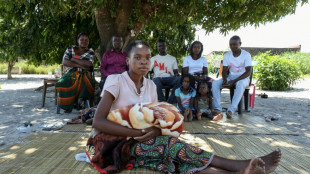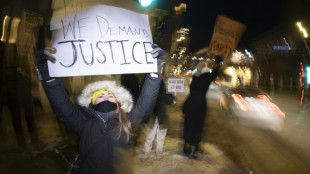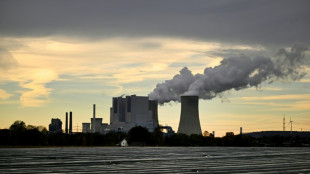
-
 Norway's Kristoffersen wins Schladming slalom
Norway's Kristoffersen wins Schladming slalom
-
Springsteen releases fiery ode to Minneapolis shooting victims

-
 Brady latest to blast Belichick Hall of Fame snub
Brady latest to blast Belichick Hall of Fame snub
-
Trump battles Minneapolis shooting fallout as agents put on leave

-
 SpaceX eyes IPO timed to planet alignment and Musk birthday: report
SpaceX eyes IPO timed to planet alignment and Musk birthday: report
-
White House, Slovakia deny report on Trump's mental state

-
 Iran vows to resist any US attack, insists ready for nuclear deal
Iran vows to resist any US attack, insists ready for nuclear deal
-
Colombia leader offers talks to end trade war with Ecuador

-
 Former Masters champ Reed returning to PGA Tour from LIV
Former Masters champ Reed returning to PGA Tour from LIV
-
US Fed holds interest rates steady, defying Trump pressure

-
 Norway's McGrath tops first leg of Schladming slalom
Norway's McGrath tops first leg of Schladming slalom
-
Iraq PM candidate Maliki denounces Trump's 'blatant' interference

-
 Neil Young gifts music to Greenland residents for stress relief
Neil Young gifts music to Greenland residents for stress relief
-
Rubio upbeat on Venezuela cooperation but wields stick

-
 'No. 1 fan': Rapper Minaj backs Trump
'No. 1 fan': Rapper Minaj backs Trump
-
Fear in Sicilian town as vast landslide risks widening

-
 'Forced disappearance' probe opened against Colombian cycling star Herrera
'Forced disappearance' probe opened against Colombian cycling star Herrera
-
Seifert, Santner give New Zealand consolation T20 win over India

-
 King Charles III warns world 'going backwards' in climate fight
King Charles III warns world 'going backwards' in climate fight
-
Minneapolis activists track Trump's immigration enforcers

-
 Court orders Dutch to protect Caribbean island from climate change
Court orders Dutch to protect Caribbean island from climate change
-
Sterling agrees Chelsea exit after troubled spell

-
 Rules-based trade with US is 'over': Canada central bank head
Rules-based trade with US is 'over': Canada central bank head
-
Lucas Paqueta signs for Flamengo in record South American deal

-
 Holocaust survivor urges German MPs to tackle resurgent antisemitism
Holocaust survivor urges German MPs to tackle resurgent antisemitism
-
'Extraordinary' trove of ancient species found in China quarry

-
 Villa's Tielemans ruled out for up to 10 weeks
Villa's Tielemans ruled out for up to 10 weeks
-
Google unveils AI tool probing mysteries of human genome

-
 UK proposes to let websites refuse Google AI search
UK proposes to let websites refuse Google AI search
-
'I wanted to die': survivors recount Mozambique flood terror

-
 Trump issues fierce warning to Minneapolis mayor over immigration
Trump issues fierce warning to Minneapolis mayor over immigration
-
Anglican church's first female leader confirmed at London service

-
 Germany cuts growth forecast as recovery slower than hoped
Germany cuts growth forecast as recovery slower than hoped
-
Amazon to cut 16,000 jobs worldwide

-
 One dead, five injured in clashes between Colombia football fans
One dead, five injured in clashes between Colombia football fans
-
Dollar halts descent, gold keeps climbing before Fed update

-
 US YouTuber IShowSpeed gains Ghanaian nationality at end of Africa tour
US YouTuber IShowSpeed gains Ghanaian nationality at end of Africa tour
-
Sweden plans to ban mobile phones in schools

-
 Turkey football club faces probe over braids clip backing Syrian Kurds
Turkey football club faces probe over braids clip backing Syrian Kurds
-
Deutsche Bank offices searched in money laundering probe

-
 US embassy angers Danish veterans by removing flags
US embassy angers Danish veterans by removing flags
-
Netherlands 'insufficiently' protects Caribbean island from climate change: court

-
 Fury confirms April comeback fight against Makhmudov
Fury confirms April comeback fight against Makhmudov
-
Susan Sarandon to be honoured at Spain's top film awards

-
 Trump says 'time running out' as Iran rejects talks amid 'threats'
Trump says 'time running out' as Iran rejects talks amid 'threats'
-
Spain eyes full service on train tragedy line in 10 days

-
 Greenland dispute 'strategic wake-up call for all of Europe,' says Macron
Greenland dispute 'strategic wake-up call for all of Europe,' says Macron
-
'Intimidation and coercion': Iran pressuring families of killed protesters

-
 Europe urged to 'step up' on defence as Trump upends ties
Europe urged to 'step up' on defence as Trump upends ties
-
Sinner hails 'inspiration' Djokovic ahead of Australian Open blockbuster

| RIO | 0.48% | 93.36 | $ | |
| RELX | -2.65% | 37.37 | $ | |
| GSK | -1.38% | 50.11 | $ | |
| CMSC | -0.53% | 23.675 | $ | |
| SCS | 0.12% | 16.14 | $ | |
| BCC | -1.16% | 80.8 | $ | |
| NGG | 0.44% | 84.685 | $ | |
| BTI | -0.28% | 60.17 | $ | |
| RBGPF | 0% | 82.4 | $ | |
| AZN | -2.55% | 93.22 | $ | |
| BP | 0.2% | 37.695 | $ | |
| RYCEF | -3.31% | 16.6 | $ | |
| BCE | -0.95% | 25.28 | $ | |
| JRI | -5.39% | 12.98 | $ | |
| VOD | 0.48% | 14.57 | $ | |
| CMSD | -0.19% | 24.0508 | $ |

Half the world faced an extra month of extreme heat due to climate change: study
Half the global population endured an additional month of extreme heat over the past year because of manmade climate change, a new study found Friday.
The findings underscore how the continued burning of fossil fuels is harming health and well-being on every continent, with the effects especially under-recognized in developing countries, the authors said.
"With every barrel of oil burned, every tonne of carbon dioxide released, and every fraction of a degree of warming, heat waves will affect more people," said Friederike Otto, a climate scientist at Imperial College London and co-author of the report.
The analysis -- conducted by scientists at World Weather Attribution, Climate Central, and the Red Cross Red Crescent Climate Centre -- was released ahead of global Heat Action Day on June 2, which this year spotlights the dangers of heat exhaustion and heat stroke.
To assess the influence of global warming, researchers analyzed the period from May 1, 2024 to May 1, 2025.
They defined "extreme heat days" as those hotter than 90 percent of temperatures recorded at a given location between 1991 and 2020.
Using a peer-reviewed modeling approach, they then compared the number of such days to a simulated world without human-caused warming.
The results were stark: roughly four billion people -- 49 percent of the global population -- experienced at least 30 more days of extreme heat than they would have otherwise.
The team identified 67 extreme heat events during the year and found the fingerprint of climate change on all of them.
The Caribbean island of Aruba was the worst affected, recording 187 extreme heat days -- 45 more than expected in a world without climate change.
The study follows a year of unprecedented global temperatures. 2024 was the hottest year on record, surpassing 2023, while January 2025 marked the hottest January ever.
On a five-year average, global temperatures are now 1.3 degrees Celsius above pre-industrial levels -- and in 2024 alone, they exceeded 1.5C, the symbolic ceiling set by the Paris climate accord.
The report also highlights a critical lack of data on heat-related health impacts in lower-income regions.
While Europe recorded more than 61,000 heat-related deaths in the summer of 2022, comparable figures are sparse elsewhere, with many heat-related fatalities misattributed to underlying conditions such as heart or lung disease.
The authors emphasized the need for early warning systems, public education, and heat action plans tailored to cities.
Better building design -- including shading and ventilation -- and behavioral adjustments like avoiding strenuous activity during peak heat are also essential.
Still, adaptation alone will not be enough. The only way to halt the rising severity and frequency of extreme heat, the authors warned, is to rapidly phase out fossil fuels.
R.Buehler--VB



